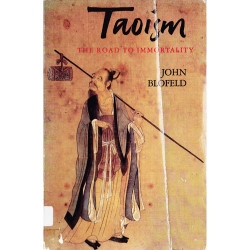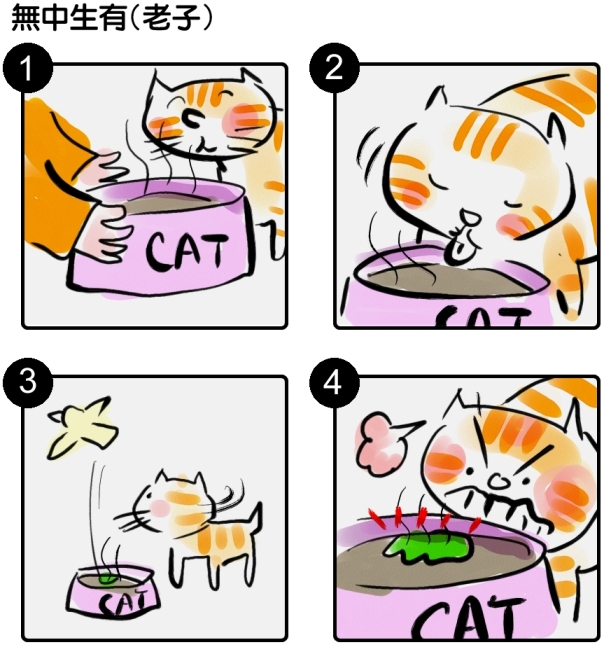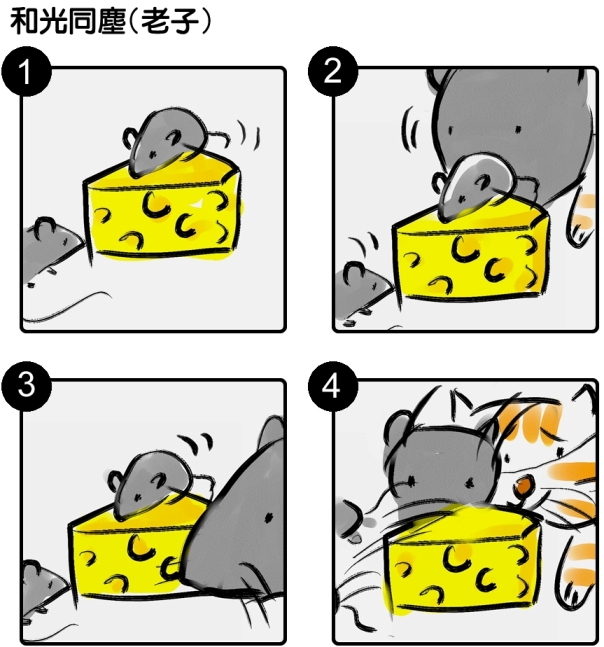Taoism the road to immortality
 |
|
Taoism - ancient, mysterious, charmingly poetic - born amidst the shining mists that shroud civilisation's earliest beginnings, is a living manifestation of an antique way of life almost vanished from the world. Now that the red tide has engulfed its homeland, who knows its further destiny or whether even tiny remnants of it will survive ? For people who recognise the holiness of nature and desire that spirit should triumph over the black onrush of materialism, it is a treasure-house wherein, amidst curiously wrought jewels of but slight intrinsic value, are strewn precious pearls and rare, translucent jades. Folklore, occult sciences, cosmology, yoga, meditation, poetry, quietist philosophy, exalted mysticism-it has them all. These are the gifts accumulated by the children of the Yellow Emperor during no less than five millenia. The least of them are rainbow-hued and the very stuff of myth and poetry; the most precious is a shining fulfilment of man's spiritual destiny, a teaching whereby humans can ascend from mortal to immortal state and dwell beyond the gods !
How strange that, with the single exception of the philosophy of those delightful sages, Lao and Chuang, so little of this has hitherto been touched upon in Western languages! Of Lao-tzû's Tao Tê Ching there are over fifty(!) translations and Chuang-tzû's work has begun to receive a modicum of the attention it deserves, but what of all the rest of Taoism? It seems that, by an ironic twist of fate, Taoists are still paying for their temerity in laughing at the humourless rectitude of the Confucian establishment that was itself swept away at the beginning of this century. Smiling individualists who, like the young people of the world today, mocked rigidity and pomposity in all its forms, they were smeared by the ruling hierarchy as people lost in superstition fit only for illiterate peasants; and the fiction that Taoism has no more to offer than picturesque but worthless superstitions has somehow stuck until today - just as, until very recently, Tibetan Buddhism was held to be Buddhism in its most degraded form! Ha ha ha ha ha ! Curiously, though both Chinese and Western scholars have scornfully echoed the Confucian strictures on Taoism as a system utterly debased, I have rarely met anyone who, prior to the coming of the red flood, actually visited Taoist hermitages for more than a day or so to discover for themselves what went on there. As for me, I did quite often visit those remote and delightfully situated places and I arrived at the conclusion that, though the obloquy hurled at Taoism is occasionally justified, it is flagrantly false in most cases.
My first surprise was to discover that, despite a widespread supposition, Lao and Chuang were not the actual founders of Taoism, but notable blossoms on a tree hoary with age even in their dayaround two and a half millenia ago! Indeed, Chuang-tzû himself makes frequent, if ironic, mention of its traditional founder, Huang Ti, the Yellow Emperor. Whether or not that excellent monarch ever existed as a person is beside the point. The dates of his reign (2697-2597 bc) place him in an epoch so remote and allow him to have reigned so long that it seems fair enough to regard him as a largely if not wholly mythical figure. But then ? Supposing there never was such a person, the poetic legends surrounding him have endowed him with reality, and why should he not be accepted as an apt symbolic representative of the shadowy founders of Taoism long lost to sight in the darkness of prehistory ? His followers speak of him poetically as a person. Would it hurt us to go along with them as we have gone along with the Romans in according a place in our history books to Romulus and Remus? The Taoists themselves like to refer to their system of belief as 'Huang Lao', thus honouring both Huang Ti (the Yellow Emperor) and Lao-tsû as their founders. This makes a lot more sense than saying that Taoism has degenerated from what it never was in the first place.
As I have said, by no means all Huang Lao beliefs and practices are of great worth. Some are too bizarre to call for more than a smile, which is scarcely surprising when one considers their enormous antiquity; yet, embedded in much charming moonshine is a precious core of wisdom and exalted spiritual aspiration so striking as to make me almost ready to believe that an 'Ancient Wisdom' was once dispersed throughout the world of which scattered fragments still remain. Huang Lao Taoism may be thought of as a kingdom wherein peasant-like naivety prevails throughout the far-flung provinces; in the central area lies a smiling parkland embellished with hills and streams where poets and lovers of nature's mysteries roam; and, in the midst of this, stands a citadel of wisdom so sublime as to lead beyond the world of mortals to the secret heart of Being. Strangers entering that kingdom without credentials are not likely to penetrate to the citadel without some effort (and courtesy!) on their part.
Even those Huang Lao beliefs that strike us as pure moonshine are touched with the magic of poetry and have long been a rich source of inspiration to painters, calligraphers and carvers of ivory and jade. They are rarely without charm and almost never ugly.
My earlier book of Taoism, The Secret and Sublime, was in most respects very different from this one; for when I wrote it I had little more to draw upon than recollections of my visits to hermitages tucked deep among the mountains and imperfectly remembered conversations with the lovable recluses dwelling there. I could speak only in very general terms about Taoist yoga and other matters pertaining to the spiritual path known as cultivation of the Way, for my primary interest in Buddhism had led me to neglect some unique opportunities of studying living Taoism thoroughly. This defect has since been repaired thanks to an invaluable gift sent to me by one of my former Chinese students - a book published by the Chung Hwa Book Company, Taipei, Taiwan, Republic of China, entitled Tao-Chia Yü Shên-Hsien (Taoist Philosophers and Immortals) by Chou Shao-hsien. The Tao Tsang or Taoist Canon, consisting of 5,485 volumes, is so vast that an Englishman with an imperfect knowledge of Chinese like myself could be excused for not even dreaming of plumbing its mysteries. Mr Chou Shao-hsien, however, has obviously spent many decades on that task, for his book contains the quintessence of what is to be found there. For various reasons it is not suitable for translation, unless for a very select English-reading public with a thorough knowledge of Chinese history and much else besides, but as source material it is invaluable, the more so as it contains carefully documented quotations from all the great Taoist masters through the ages. With that and some other works to fall back on and my own memories to lend colour to the scene, I have been able to write much more authentically of Taoism than before. To the best of my knowledge, the present work is the first attempt ever made to give a comprehensive sketch in English of Huang Lao Taoism as a whole.
The cream of my researches, of which the principal source is Mr Chou's work, will be found in the eighth and ninth chapters. The precious eight-stage Yoga of Immortality detailed in Chapter 8 can be practised to perfection only with the guidance of a gifted teacher; certain omissions have been inevitable, for the yoga is a secret one and some of its essentials can never have been committed to writing. Alas, Taoist teachers these days are almost as rare as horns on a rabbit or dugs on a serpent; even so, the written instructions are far from useless; even though they do not reveal all secrets, they can lead to a state of spiritual exaltation, whether the yoga is practised on its own as originally intended or as a support to some other meditative or yogic practice (Taoist, Buddhist or otherwise) of the yogin's own choosing. It is not impossible that this yoga, if carried out with unwavering determination by one who has truly mastered the art of stillness, will lead to the glorious spiritual apotheosis set forth in Chapter 9, that of expanding the yogin's being to include the entire universe - the most dazzling prospect ever held up to man!
I am immensely grateful to that devoted scholar, Chou Shao-hsien, whose book may do much to assist Taoism to survive these days of peril. To him I owe not only most of the yogic knowledge just mentioned, but also many of the quotations from the Taoist Canon scattered throughout this book, some of the details embodied in my text (such as the description of the Shantung coast opposite the Isles of the Immortals), and all the poems in my chapter on the Poetry of Stillness. I also offer my warmest thanks to Burton Watson from whose translation of Chuang-tzû I have, as on a previous occasion, borrowed extensively. Both these men richly deserve the honorary title of Immortal and who knows but that they will attain true immortality by virtue of their learning and wisdom? I greatly appreciate the kindness of the Chung Hwa Book Company and the Columbia University Press in permitting me to make use of Mr Chou's and Dr Watson's works respectively.
Among English works I have consulted, the following may be of interest to readers who would like to know more of various aspects of Taoism :
Yoga
Taoist Yoga by Lu K'uan-yu (Allen & Unwin) ; Sexual Life in Ancient China by Robert Van Gulik (Brill, Leyden).
Philosophy
Truth and Nature, a particularly enlightening translation of the Tao Tê Ching by Chêng Lin (Wan Kuo Shu Tien, Hong Kong); Lao Tzû: Tao Te Ching by D. C. Lau (Penguin); Chuang-Tzû by Burton Watson (Columbia).
Folklore
The Eight Immortals by T. C. Lai (Swindon, Hong Kong).
Magic
Tao Magic by Lazzlo Legezzo (Panther) - a most excellent book !
Art
Creativity and Taoism by Chang Chung-yuan (Harper Row).
General
Taoism by Holmes Welch (Beacon Press); The Secret and Sublime by John Blofeld (Allen & Unwin and also Dutton).
The list is short, but could not be greatly lengthened, except under the heading 'Philosophy', for that is the only aspect of Taoism on which many works are available in English and even these are largely confined to just one subject, the Tao Tê Ching. Much remains to be written on the subjects of Taoist yoga and mysticism especially. Taoist magic and Taoist art are other fruitful fields. If some Taoist beliefs strike us as naive, that naivety is more than redeemed by poetic charm. Going further, one may taste the cool tranquility of philosophers and poets enraptured by nature's mysteries, glean yogic knowledge of true worth and, in the end, learn how to mount upon a dragon, soar above the clouds to the palaces of immortals and, having supped with them on wind and dew or powdered moonbeams, penetrate to the very source of Being - the immaculate, undifferentiated Tao ! This can be done !
john blofeld, who once received
a cherished title he
would wish to revive - the
'Ox-Head Recluse'
The Garden of Immortals
Mid-Autumn Festival
4673rd Year since the
Accession of the Yellow
Emperor (1976)
您的評論: 注意: 評論內容不支持HTML代碼!
顧客評分: 差評 好評
請在下框輸入驗證號碼:




